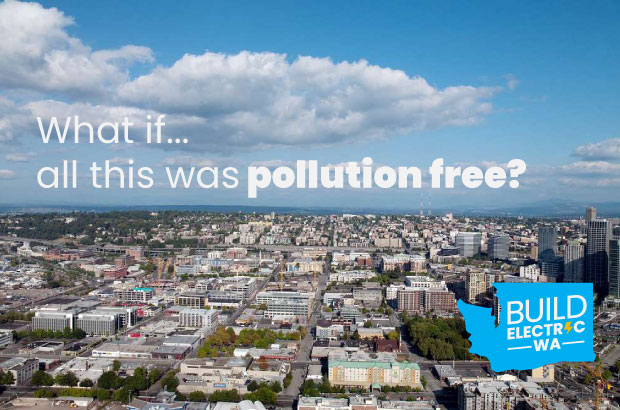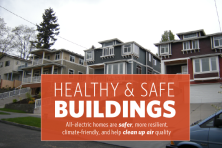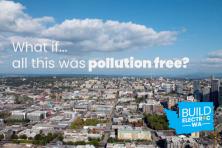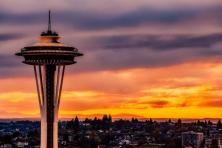NOTE: Now's a great time to send a public comment telling the State Building Code Council that you support code amendments to require heat pumps for space and water heating in new commercial and large multifamily buildings! Read on...
The past year has been exciting for climate action on clean and safe buildings in Washington. Notably the biggest drivers of change came at the local level: Seattle and Shoreline became the first two cities in the state to pass policies that eliminate most uses of fossil fuels in new commercial and large (over four stories) multifamily buildings, and Bellingham followed suit just this month.
As we’ve talked about before, addressing fossil fuel use in our buildings is a big win for climate, health, and safety, since buildings are currently the fastest-growing source of carbon emissions in Washington. 93% of commercial buildings currently use fossil gas for heating and cooling buildings. Gas is also the leading source of early deaths and health costs from commercial buildings. To meet our statewide climate goals, we must take advantage of Washington’s soon-to-be 100% clean electricity grid and shift our buildings to being powered by highly-efficient electric heat pumps (which also provide cooling during hot summers).
Cities are a critical part of climate leadership nationwide and are increasingly acting on building emissions to help meet climate goals, protect residents’ health and safety, and grow clean energy jobs. Both Seattle and Shoreline acted on clean buildings through updates to their building codes.
Sound a little wonky and obscure? The State Building Code Council, a state agency of appointed members, sets a minimum statewide building code for all buildings that regulates everything from structures, zoning, and energy use. Local governments can go beyond these minimums for commercial and multifamily buildings and require greater energy efficiency and include other climate- and health-friendly policies.
This year, we expect to see other cities and counties, including unincorporated King County, to follow Seattle and Shoreline’s footsteps and act on their building codes. But 2022 also presents a unique opportunity to have these benefits apply across the entire state instead of individual jurisdictions: the SBCC can require clean, electric space and water heating for all commercial buildings statewide.
Not only will this level the playing field for the cities and counties that are acting on climate, but according to analysis from RMI, these changes could eliminate 8.1 million tons of carbon by 2050 – without adding significant costs for commercial building owners and developers. A 2019 study found that new medium-sized office buildings and small retail stores had no significant additional cost to go fully electric, and that small hotels would even save money by going all-electric. On the other hand, if we keep constructing buildings and expanding our use of gas, owners will have to pay even more money down the line for clean energy retrofits.
The State Building Code Council needs to listen to communities and local governments that are acting boldly to require clean, safe, electric buildings – and support them by making sure that these benefits are distributed statewide. And we need your help to tell them, since the fossil fuel industry is doing everything in its power to stop climate action from happening. The council only updates their codes every three years, so now is the time to act and encourage them to set an example nationally by developing the most climate-friendly statewide building codes in the country.
Take action
Send a public comment to tell the State Building Code Council that you support code amendments to require heat pumps for space and water heating in new commercial and large multifamily buildings! And please try and get others to send in comments, too.





